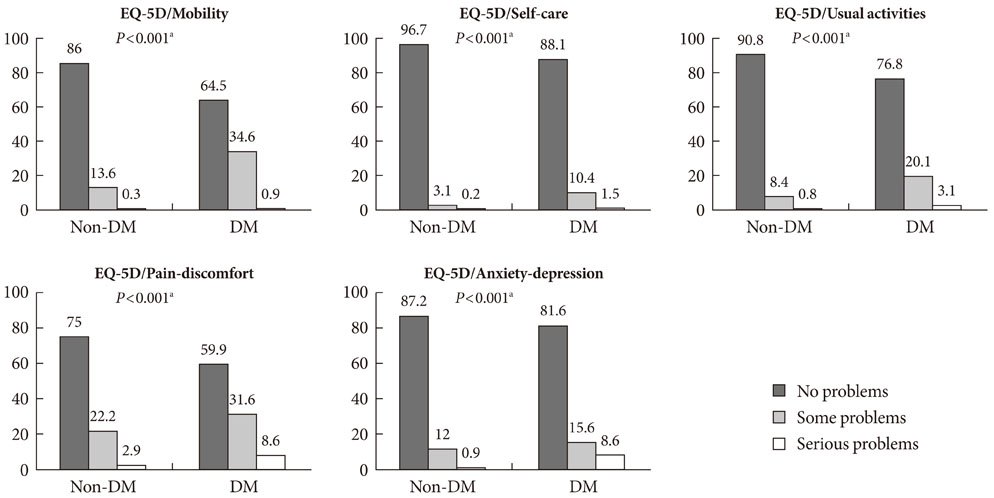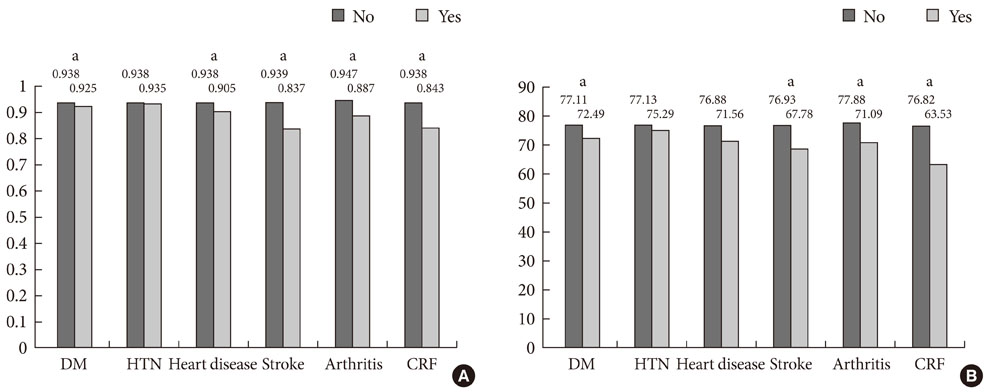The Relationship between Diabetes Mellitus and Health-Related Quality of Life in Korean Adults: The Fourth Korea National Health and Nutrition Examination Survey (2007-2009)
- Affiliations
-
- 1Department of Endocrinology and Metabolism, Ajou University School of Medicine, Suwon, Korea. djkim@ajou.ac.kr
- 2Division of Endocrinology, Department of Internal Medicine, Myongji Hospital, Kwandong University College of Medicine, Goyang, Korea.
- KMID: 2280726
- DOI: http://doi.org/10.4093/dmj.2011.35.6.587
Abstract
- BACKGROUND
Diabetes is a major health problem in Korea. However, interest in the quality of life in patients with diabetes is low. We examined the effects of diabetes on health-related quality of life (HRQoL) and compared it with HRQoL in the general Korean population using the Fourth Korea National Health and Nutrition Examination Survey (KNHANES IV) (2007-2009).
METHODS
Using KNHANES IV data, we compared EuroQol (EQ)-5D and EQ-visual analogue scale (VAS) scores after adjusting for sociodemographic and psychosocial factors as well as for comorbidities (hypertension, heart disease, stroke, arthritis, and chronic renal disease). Logistic regressions were used to explore determinants for the lowest quintile HRQoL scales in the diabetes group.
RESULTS
The mean age of the 14,441 enrolled subjects (6,129 men and 8,312 women) was 52.5+/-14.5 years. The mean EQ-5D and EQ-VAS scores were significantly lower in the diabetes group (EQ-5D. 0.87; EQ-VAS, 71.94) than in the non-diabetes group (EQ-5D, 0.94; EQ-VAS, 77.40) (P<0.001). Self-reported depressive symptom had a significant effect on lowering the EQ-VAS (odds ratio [OR], 1.7; 95% confidence interval [CI], 1.1 to 2.6) in the diabetes group. Stress level had a significant effect in lowering both the EQ-5D (OR, 2.0; 95% CI, 1.3 to 2.9) and the EQ-VAS (OR, 1.9; 95% CI, 1.3 to 2.9). HbA1c, diabetes duration, and treatment modalities had no significant effect on lowering HRQoL.
CONCLUSION
Diabetes was clearly associated with impaired HRQoL compared with the non-diabetic population regardless of comorbidities. Therapeutic approaches should focus much more on the subjective perception of health in patients with diabetes.
Keyword
MeSH Terms
Figure
Cited by 4 articles
-
Quality of Life in Patients with Osteoporotic Vertebral Compression Fractures
Ho Jin Jung, Ye-Soo Park, Hyoung-Yeon Seo, Jae-Chul Lee, Ki-Chan An, Jin-Hyok Kim, Byung-Joon Shin, Tae Wook Kang, Si Young Park
J Bone Metab. 2017;24(3):187-196. doi: 10.11005/jbm.2017.24.3.187.Diabetes Fact Sheet in Korea, 2016: An Appraisal of Current Status
Jong Chul Won, Jae Hyuk Lee, Jae Hyeon Kim, Eun Seok Kang, Kyu Chang Won, Dae Jung Kim, Moon-Kyu Lee
Diabetes Metab J. 2018;42(5):415-424. doi: 10.4093/dmj.2018.0017.Diet Therapy in Patients of Diabetic Nephropathy
Ji-Youn Kim
J Korean Diabetes. 2013;14(1):27-31. doi: 10.4093/jkd.2013.14.1.27.The role of nutritional status in the relationship between diabetes and health-related quality of life
Sohyun Park, Sukyoung Jung, Hyunsook Yoon
Nutr Res Pract. 2022;16(4):505-516. doi: 10.4162/nrp.2022.16.4.505.
Reference
-
1. Rubin RR, Peyrot M. Quality of life and diabetes. Diabetes Metab Res Rev. 1999. 15:205–218.2. Constitution of the World Health Organization. Handbook of basic documents. 1952. 5th ed. Geneva: Palais des Nation;3–20.3. Saito I, Inami F, Ikebe T, Moriwaki C, Tsubakimoto A, Yonemasu K, Ozawa H. Impact of diabetes on health-related quality of life in a population study in Japan. Diabetes Res Clin Pract. 2006. 73:51–57.4. Alonso J, Ferrer M, Gandek B, Ware JE Jr, Aaronson NK, Mosconi P, Rasmussen NK, Bullinger M, Fukuhara S, Kaasa S, Leplege A. IQOLA Project Group. Health-related quality of life associated with chronic conditions in eight countries: results from the International Quality of Life Assessment (IQOLA) Project. Qual Life Res. 2004. 13:283–298.5. Kleefstra N, Landman GW, Houweling ST, Ubink-Veltmaat LJ, Logtenberg SJ, Meyboom-de Jong B, Coyne JC, Groenier KH, Bilo HJ. Prediction of mortality in type 2 diabetes from health-related quality of life (ZODIAC-4). Diabetes Care. 2008. 31:932–933.6. Choi YJ, Kim HC, Kim HM, Park SW, Kim J, Kim DJ. Prevalence and management of diabetes in Korean adults: Korea National Health and Nutrition Examination Surveys 1998-2005. Diabetes Care. 2009. 32:2016–2020.7. Korea National Statistical Office. 2005 statistical results about cause of death. 2006. Daejeon: Korea National Statistical Office.8. Kim SM, Lee JS, Lee J, Na JK, Han JH, Yoon DK, Baik SH, Choi DS, Choi KM. Prevalence of diabetes and impaired fasting glucose in Korea: Korean National Health and Nutrition Survey 2001. Diabetes Care. 2006. 29:226–231.9. The EuroQol Group. EuroQol--a new facility for the measurement of health-related quality of life. Health Policy. 1990. 16:199–208.10. Brooks R. EuroQol: the current state of play. Health Policy. 1996. 37:53–72.11. Nam HS, Kim KY, Kwon SS, Koh KW, Poul K. EQ-5D Korean valuation study using time trade of method. 2007. Seoul: Centers for Disease Control and Prevention.12. Ware JE Jr, Sherbourne CD. The MOS 36-item short-form health survey (SF-36). I. Conceptual framework and item selection. Med Care. 1992. 30:473–483.13. Smith DW. The population perspective on quality of life among Americans with diabetes. Qual Life Res. 2004. 13:1391–1400.14. Stewart AL, Greenfield S, Hays RD, Wells K, Rogers WH, Berry SD, McGlynn EA, Ware JE Jr. Functional status and well-being of patients with chronic conditions. Results from the Medical Outcomes Study. JAMA. 1989. 262:907–913.15. Vickrey BG, Hays RD, Rausch R, Sutherling WW, Engel J Jr, Brook RH. Quality of life of epilepsy surgery patients as compared with outpatients with hypertension, diabetes, heart disease, and/or depressive symptoms. Epilepsia. 1994. 35:597–607.16. Naess S, Midthjell K, Moum T, Sorensen T, Tambs K. Diabetes mellitus and psychological well-being. Results of the Nord-Trondelag health survey. Scand J Soc Med. 1995. 23:179–188.17. Ali S, Stone M, Skinner TC, Robertson N, Davies M, Khunti K. The association between depression and health-related quality of life in people with type 2 diabetes: a systematic literature review. Diabetes Metab Res Rev. 2010. 26:75–89.18. Kontodimopoulos N, Pappa E, Papadopoulos AA, Tountas Y, Niakas D. Comparing SF-6D and EQ-5D utilities across groups differing in health status. Qual Life Res. 2009. 18:87–97.19. Kopec JA, Willison KD. A comparative review of four preference-weighted measures of health-related quality of life. J Clin Epidemiol. 2003. 56:317–325.20. Longworth L, Bryan S. An empirical comparison of EQ-5D and SF-6D in liver transplant patients. Health Econ. 2003. 12:1061–1067.21. Glasziou P, Alexander J, Beller E, Clarke P. ADVANCE Collaborative Group. Which health-related quality of life score? A comparison of alternative utility measures in patients with type 2 diabetes in the ADVANCE trial. Health Qual Life Outcomes. 2007. 5:21.22. Influence of intensive diabetes treatment on quality-of-life outcomes in the diabetes control and complications trial. Diabetes Care. 1996. 19:195–203.23. Boyer JG, Earp JA. The development of an instrument for assessing the quality of life of people with diabetes. Diabetes-39. Med Care. 1997. 35:440–453.24. Polonsky WH, Anderson BJ, Lohrer PA, Welch G, Jacobson AM, Aponte JE, Schwartz CE. Assessment of diabetes-related distress. Diabetes Care. 1995. 18:754–760.25. El Achhab Y, Nejjari C, Chikri M, Lyoussi B. Disease-specific health-related quality of life instruments among adults diabetic: a systematic review. Diabetes Res Clin Pract. 2008. 80:171–184.
- Full Text Links
- Actions
-
Cited
- CITED
-
- Close
- Share
- Similar articles
-
- The effects of toothache experience and oral health behavior on Health-Related Quality of Life in Korean adults -using the second edition of the 8th National Health Nutrition Survey (2019-2020)
- Diabetes Risk Score for Korean Adults
- Fundus Examination Rate in Diabetics and the Public Health Factors Associated With Fundus Examination Rate
- Associated Factors with Health-related Quality of Life among Older Adults with Diabetes in Korea
- Relationship between Diabetes Mellitus and Anemia in Korean Adults-Based on the Korean National Health and Nutritional Examination Survey VI



